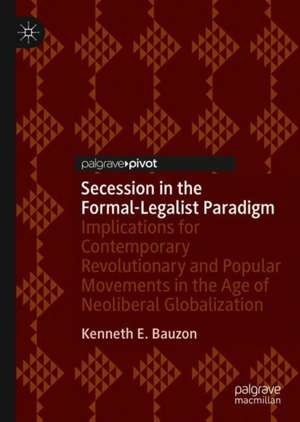Secession in the Formal-Legalist Paradigm: Implications for Contemporary Revolutionary and Popular Movements in the Age of Neoliberal Globalization
Autor Kenneth E. Bauzonen Limba Engleză Hardback – 29 sep 2020
Narrow adherence to textual sources and the literal approach, have led formal-legalists to miss, willfully ignore, or endorse the paradigm's strategic association with state power, evolving since the dawn of the Enlightenment. Formal-legalism has lent itself amenable to the interests of the state and to the variable construction of the meaning of the law devoid of original spirit and universality but conforming with the specific interests of the state or, for that matter, the prevailing American empire, both spatially and temporally. Accounting for this anomaly, the historical materialist perspective is considered, with appropriate historical and contemporary illustrations, as a relevant explanatory alternative to the now-obsolescent formal-legalist paradigm. With the assumption that, indeed, economic and material considerations such as those demanded by the dominant class elements within the state underlie the rationale for the state, formal-legalism has evolved from one that initially provided a presumed objective view of society to one that has subjectively become an essential part of the cultural suprastructure that allows these elements to command the state as a principal tool for labor- and value-extraction during what is popularly known as contemporary neoliberal globalization.
Preț: 451.26 lei
Nou
Puncte Express: 677
Preț estimativ în valută:
86.35€ • 92.34$ • 71.100£
86.35€ • 92.34$ • 71.100£
Carte tipărită la comandă
Livrare economică 18 aprilie-02 mai
Preluare comenzi: 021 569.72.76
Specificații
ISBN-13: 9789811575006
ISBN-10: 9811575002
Pagini: 137
Ilustrații: XVIII, 137 p. 1 illus.
Dimensiuni: 148 x 210 mm
Greutate: 0.34 kg
Ediția:1st ed. 2021
Editura: Springer Nature Singapore
Colecția Palgrave Macmillan
Locul publicării:Singapore, Singapore
ISBN-10: 9811575002
Pagini: 137
Ilustrații: XVIII, 137 p. 1 illus.
Dimensiuni: 148 x 210 mm
Greutate: 0.34 kg
Ediția:1st ed. 2021
Editura: Springer Nature Singapore
Colecția Palgrave Macmillan
Locul publicării:Singapore, Singapore
Cuprins
1. Introduction.- 2. The Formal-Legalist Explanation.- 3. Critique of Formal-Legalism.- 4. The Return of Historical Materialism.- 5. Epilogue.
Notă biografică
Kenneth E. Bauzon, with a doctorate in Political Science from Duke University, in Durham, North Carolina, is currently Professor of Political Science at Saint Joseph's College in New York, USA. He has also taught in a visiting capacity at various institutions including Old Dominion University in Norfolk, Virginia, Lafayette College in Easton, Pennsylvania, Yeshiva University in New York City, and Tsukuba University in Tsukuba, Japan. He has received research and travel awards most notably a multi-year grant from the Japan Ministry of Education (Monbusho) as a member of a multidisciplinary project on comparative multiculturalism in the United States, Canada, Japan, and Australia; and, as a Fulbright Fellow to Egypt and Israel.
Textul de pe ultima copertă
This book explores how formal-legalism, as the dominant paradigm of explanation, has sought to explain the phenomenon of secessionism among its practitioners as a problem for the modern state. This study bears how these practitioners have, over time, described, defined, and proposed to solve secessionism and related political problems within the logic of their paradigm. In the process, the book reconstructs the formalist worldview and the practitioners’ fundamental presuppositions which, to them, render comprehensible and meaningful the occurrence of events, like secession, as well as means of dealing with it. More significantly, the book exposes a debilitating flaw of formal-legalist paradigm as it fails to account for other principles of mobilization in political and social life that defy formal-legal rules such as those based on race, ethnicity, language, culture, and material factors.
Narrow adherence to textual sources and the literal approach, have led formal-legalists to miss, willfully ignore, or endorse the paradigm's strategic association with state power, evolving since the dawn of the Enlightenment. Formal-legalism has lent itself amenable to the interests of the state and to the variable construction of the meaning of the law devoid of original spirit and universality but conforming with the specific interests of the state or, for that matter, the prevailing American empire, both spatially and temporally. Accounting for this anomaly, the historical materialist perspective is considered, with appropriate historical and contemporary illustrations, as a relevant explanatory alternative to the now-obsolescent formal-legalist paradigm. With the assumption that, indeed, economic and material considerations such as those demanded by the dominant class elements within the state underlie the rationale for the state, formal-legalism has evolved from one that initially provided a presumed objective view of society to one that has subjectively become an essential part of the cultural suprastructure that allows these elements to command the state as a principal tool for labor- and value-extraction during what is popularly known as contemporary neoliberal globalization.
Kenneth E. Bauzon, with a doctorate in Political Science from Duke University, in Durham, North Carolina, is currently Professor of Political Science at Saint Joseph's College in New York, USA.
Caracteristici
Is inspired by the work of Thomas Kuhn at the advent of the post-behavioralist revolt to the behavioral movement Adopts the paradigmatic approach to explain the growth and development of formal-legalism Examines the fundamental presuppositions of practitioners of the formal-legal paradigm through the lens of “insurgent paradigms” Offers an alternative paradigm, based on the presuppositions of historical materialism Emphasizes the epistemology of the state as it bears on the subject of secession and implications bearing on contemporary revolutionary and political movements
